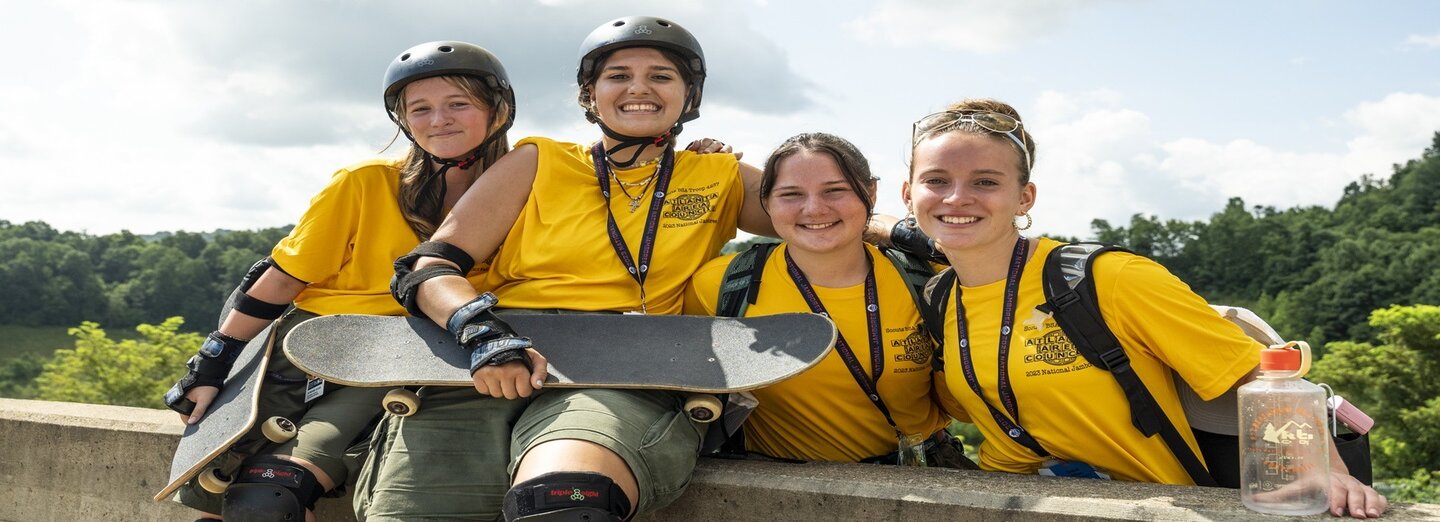
SUMMARY
Skateboarding is super fun, especially when you’re working towards earning the Skating Merit Badge! But the most important thing is to keep it safe for everyone involved.
On average, almost half of all skateboarding injuries involve children under age 15 and most of the children injured are boys. Many injuries happen when you lose balance, fall off the skateboard and land on an outstretched arm. Skateboarding injuries often involve your wrist, ankle, or face.
So, when you’re out there skating and trying to earn that badge, there are some important safety rules to remember.
GENERAL INFORMATION
Wear Proper Protective Gear
Before getting on your skateboard, empty your pockets of all hard and sharp objects and put on your protective gear.
Essential protective equipment includes:
- A properly fitting helmet.
- Wrist guards help support the wrist and reduce the chances of breaking a bone if you fall.
- Knee and elbow pads reduce the severity of cuts and scrapes and prevent gravel burns.
- Closed-toe shoes that have slip-resistant soles.
- Goggles or glasses can keep debris out of the eyes.
Choose a Safe Environment
If you’re at a skate park – which is a cool place to practice your moves – always follow the rules posted there. Skate parks have specific guidelines to keep everyone safe. Skate parks often contain more advanced terrain and are not advised for novice riders so exercise caution if you are a new skater.
- Avoid skateboarding on irregular surfaces. Always screen the area before you skateboard, inspecting surfaces for cracks, rocks, and other debris.
- Do not use homemade skateboard ramps.
- Never use your skateboard in wet weather.
- Avoid skateboarding in crowded walkways or in darkness.
- Never hold onto the side or rear of a moving vehicle while riding a skateboard (“skitching”).
Skills and Supervision
As you’re working on those skateboarding skills for the Skating Merit Badge, start with the basics. Before trying more challenging maneuvers, it is important to practice and master the basic skills of skateboarding, especially how to stop, slow down, and turn. In addition:
- Be able to fall safely. If you are losing your balance, crouch down on the skateboard so that you will not have as far to fall. Try to land on the fleshy parts of your body rather than your arms. Relax and roll.
- Skateboard according to your ability level. Skateboarding skills are not acquired quickly or easily. Do not take chances by skateboarding faster than your experience allows, or faster than is safe for the surrounding conditions.
- Stay in good physical condition to help to prevent skateboarding injuries.
When you’re at the skate park or practicing elsewhere, always have experienced leader around. These folks know about skateboarding safety and can guide you on the right techniques. If they see anything unsafe, they’ll step in to keep everyone out of harm’s way.
And remember, it’s not just about your safety – look out for your fellow skateboarders too. If anything doesn’t seem right, let the leaders know so they can help.
Additional Safety Tips:
- Always practice tricks and jumps in a controlled environment.
- Be considerate of fellow skateboarders, especially those who are younger and/or less skilled.
- Take turns on ramps or other equipment.
- Do not use headphones while skateboarding.
- Never put more than one person on a skateboard.
- If you are skateboarding with friends and you are in the lead, call out and point to the hazard to alert the skaters behind you.
By always keeping safety in mind as you work on the Skating Merit Badge and skate at the park, you’ll not only have a blast but also stay true to the important Scout values of responsibility and preparedness. So, have fun, be safe, and enjoy earning that badge!





